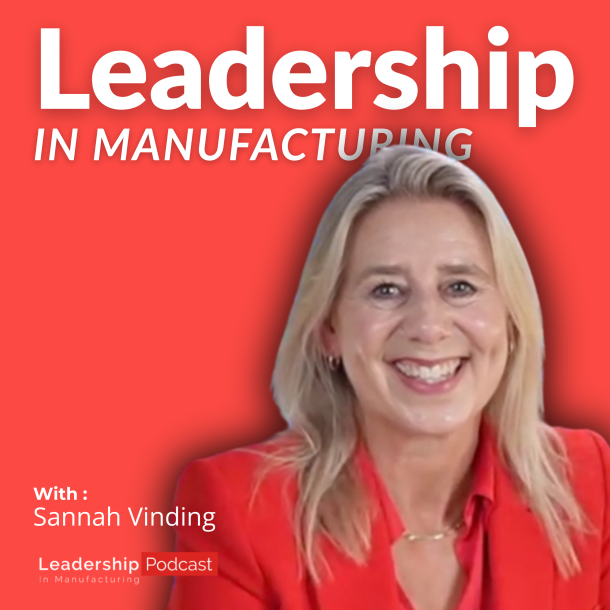Episode 63
Navigating the Changing Landscape of the Electronics Industry

In this episode of Leadership in Manufacturing Podcast, your host Sannah Vinding is joined by Chris Beeson, the President for Electronics and Global Strategic Suppliers at the RS Group, about the trends and challenges in the electronics industry.
In this insightful conversation, Chris Beeson shares his thoughts on various aspects of the industry, including supply chain management, performance-based systems, and automation. The speakers also touch on topics such as innovation, fostering positive team culture, and the importance of ESG and better world products. In addition, they discuss the challenges of remote work and how to stay competitive in the industry while maintaining human connection and relationship-building.
Join us for this engaging conversation that offers valuable insights for anyone interested in the electronics industry.
Host
Sannah Vinding
Guest
Episode
E63
Key takeaways

Innovation in the electronics industry does not always have to be focused on the latest technology. Taking a step back and looking at things from a different perspective can lead to creative problem-solving.

The importance of fostering a culture that prioritizes listening to the needs of employees and being adaptable in the face of change.

Leaders who are curious and willing to explore areas outside of their expertise can gain new perspectives and insights that ultimately contribute to their growth and development.
“Our business has a relationship orientation, which is a good thing, but there’s also a growing trend to be very performance-based.”
The Collective Responsibility of Building a Strong Company Culture in the Electronics Industry
A strong company culture is essential for achieving success. Prioritizing listening, adaptability, and openness to change can help companies stay ahead of the curve and quickly respond to new technologies and trends. However, building and sustaining a positive company culture is not solely the responsibility of management or HR. It is a collective responsibility that requires active participation from everyone in fostering collaboration, innovation, and continuous learning. Regardless of their level, employees should strive to be active listeners, embrace change, and be willing to adapt to new challenges. By embracing this collective responsibility, the electronics industry can develop a more dynamic and resilient workforce, equipped to navigate the rapidly changing technology landscape.
To achieve a strong company culture that prioritizes listening, adaptability, and openness to change, companies can implement various strategies. For instance, companies can provide employees with regular feedback and recognition, creating a culture that encourages growth and learning. It is also crucial to establish clear communication channels that allow for effective communication and feedback exchange. In addition, companies can promote diversity and inclusion by creating a safe and welcoming environment that values all perspectives and backgrounds. Furthermore, companies can provide employees with training and development opportunities to enhance their skills and adaptability to industry changes. By implementing these strategies, companies can foster a positive culture that benefits both the organization and its employees in the electronics industry.
“I think the pandemic has taught us to become better listeners, which is a crucial skill in any industry. It has reminded us of the importance of truly hearing and understanding our employees, customers, and stakeholders.”
When employees feel heard and valued, they are more likely to be satisfied with their work, resulting in improved morale and retention rates. Furthermore, a listening culture fosters a collaborative and inclusive environment where all employees feel empowered to contribute their ideas and perspectives.
This promotes adaptability and openness to change, allowing companies to stay ahead of industry trends and make informed decisions. A positive company culture not only attracts top talent but also enhances the company’s reputation, resulting in increased customer loyalty and sales. In summary, a strong company culture that prioritizes listening, adaptability, and openness to change is critical for success in the electronics industry
“To get the best out of your team, you need an organization that can adapt and scale to their needs, allowing them to work at their full potential.”
The Vital Role of Communication Skills in Fostering Success in the Electronics Industry
Communication skills involve conveying information, thoughts, and ideas effectively to others. In the electronics industry, having strong communication skills is essential for success. With a rapidly evolving industry, companies must prioritize a listening culture and encourage adaptability and openness to change. Effective communication allows for collaboration between team members, a clearer understanding of tasks and goals, and efficient problem-solving. Moreover, it helps build a positive company culture where employees feel valued and heard. In an industry where innovation is vital, possessing strong communication skills can make all the difference in staying ahead of the competition.
In addition to benefiting the company, strong communication skills can also enhance an individual’s career development in the electronics industry. Effective communication enables individuals to convey their ideas and opinions confidently, build relationships with colleagues and clients, and negotiate with clarity and precision. It also allows individuals to receive feedback and constructive criticism that can help them improve their skills and progress in their careers. Therefore, investing in communication skills development can benefit both the company and the individual employee in the electronics industry.
Prioritizing Listening and Adaptability: The Essential Keys to Building a Thriving Company Culture
Fostering a culture that prioritizes listening to the needs of employees and being adaptable in the face of change is not just important, it’s essential. When employees feel heard and supported, they are more engaged, productive, and loyal to their company. And when companies are adaptable to change, they are able to stay competitive and thrive in an ever-evolving business landscape.
So let’s prioritize listening and adaptability, and watch our organizations soar to new heights.
Chris Beeson

Chris Beeson
President - Electronics & Global Strategic Suppliers, RS Group
President for electronics & global strategic suppliers at RS group.
Previously, Chris spent 15 years at Digi-Key culminating in the role of
Executive Vice President Sales, Supplier Management and Business Development.
His extensive experience of the global distribution market also includes roles at Avnet, Master Electronics, and Future Electronics.
Related Episodes
How Leaders Start Using AI Without Overwhelming Their Teams – Episode 134
How leaders can start using AI without overwhelming teams or losing trust. Learn practical, people-first AI adoption strategies for manufacturing, electronics, and supply chain leadership.
How Leaders Turn Technical Data Into Faster Sales Answers Using AI – Episode 133
Learn how leaders build AI agents to support sales and engineering teams, speed up technical answers, and adopt AI without losing trust, judgment, or customer experience in manufacturing.
New Episodes
Bi-Weekly Tuesday







